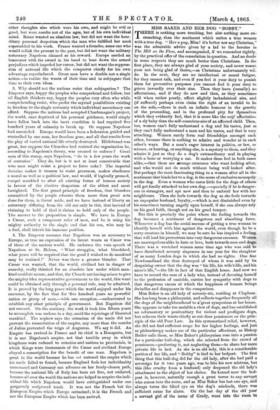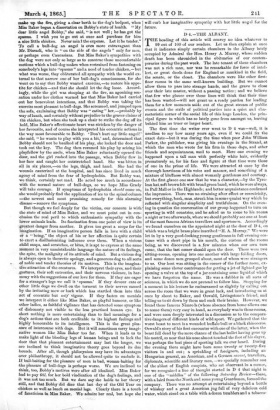MISS BAKER A/sTD HER DOG "BOBBY."
THERE is nothing more touching, but also nothing more en- croaching, than the sentiment which unites a true woman with a true dog. " Hev a pup, Miss I it's better nor any Christian," was the admirable advice given by a lad to the heroine in The Mill on the Floss, and accompanied, if we remember rightly, by the practical offer of the consolation in question. And no doubt in some respects they are much better than Christians. In the first place, they are always glad of your society, and never resent your not being glad of theirs,—as Christians unfortunately wiL do. In the next, they are no intellectual or moral fatigue, for they cannot talk, and even if you feel it your duty to punish them for preventive purposes you cannot feel it your duty to grieve inwardly over their sins. Then they have (usually) no affectations, and if they do now and then, as they sometimes will when rather poorly, affect slightly lackadaisical airs, and (if suffered) perhaps even claim the right of an invalid to lie on the sofa,—there is such an infinite humour in the gravity of the proceeding, and in the profound pity for themselves which they evidently feel, that it is more like the nal/ alfectatios of a sly baby than the self-conscious airs of an affected child. Then, too, women can't fully understand a dog and his tastes, just as they can't fully understand a man and his tastes, and that is very attaching. Women rarely form real friendships amongst each other, because there is nothing to admire and wonder at in each other's ways. But a man's eager interest in politics, or law, or science, or hunting, or anything else, is a mystery to them, and they admire it just as they do a dog's extraordinary zeal in playing with a bone or worrying a cat. It makes them feel in both cases alike,—that these are orange creatures who want looking after, and who would not do much without being well looked after. But perhaps the most fascinating thing to a woman after all in the sentiment that binds her to a dog, is the sense of exclusive monopoly in the dog. Even a woman who cares little for the dogs of others will get fondly attached to her own dog,—especially if he is danger- ous to strangers, and apt now and then to embroil her with her neighbours. Then she feels towards the dog as she feels towards an unpopular husband, loyalty,—which is not diminished even by his sometimes turning angrily upon herself, if she can always rely
on his good faith, though not on his good temper. •
But this is precisely the point where the feeling towards the dog becomes a sentiment of dangerous and absorbing force. Whenever a dog has the social success of 'getting a true woman to identify herself with him against the world, even though he be a sorry creature in himself, we may be sure he has inspired a feeling., that will lead his protectress into very dangerous excesses. Women. are unscrupulous alike in hate or love, both towards men and dotW There was a wretched woman some time ago who was said io have distributed seventy sixpences in one year for the slaughter of as many London dogs in which she had no rights. . One fine Newfoundland she thus destroyed of whom it was said by its despairing owner that the dog was "his life, his wife's life, and his niece's life,"—the life in fact of that English home. And now we have to record the case of a lady who, instead of devoting herself to the profession of canicide, carries her sympathy with dogs to that dangerous excess at which the happiness of human beings dwindles and disappears in the comparison.
Miss Baker is an old lady of seventy-six, residing at Clapham. She has long been a philocynist, and collects together frequently all the dogs of the neighbourhood to *seat symposium at her house. She appears to take too amiable a view of dogs, and has established no reformatory or penitentiary for violent and profligate dogs, but relieves their wants chiefly as out-door pensioners on the prin- ciple of the old Poor Law. In this systematized relief, however, she did not find sufficient scope for her higher feelings, and just as philanthropy makes use of the particular affections, as Bishop Butler calls them, so Miss Baker's philocyniean rose into a passion for a particular bull-dog, which she selected from the crowd of pensioners—preferring it, not neglecting them—to share her more private life in bed. As she is an old lady, this is a considerable portion of her life, and "Bobby" is tied to her bedpost. The first thing that this bull-dog did for the old lady, after she had paid a sovereign for it two years ago, was to bite his new mistress, but this (like cruelty from a husband) only deepened the old lady's attachment to the object of her choice. Its kennel near the beds post is, however, naturally enough a great terror to any servant who comes into the room, and as Miss Baker has lost one eke, and always turns the blind eye on the dog's misdeeds, there was sufficient cause for alarm. On the last day of the old year a servant girl of the name of Grady, went into the 'tom to
reale up the fire, giving a clear berth to the dog's bedpost, when Miss Baker began a dissertation on Bobby's state of health. "My dear little angel Bobby," she said, "is not well ; he has got the spasms. I wish you to go out at once and purchase for him a nice little chicken. Never mini the expense. Let it be tender." To call a bull-dog an angel is even more extravagant than Mr. Disraeli, who is "on the side of the angels" only for men, or perhaps even Caucasians. But Miss Baker's sympathies with the dog were not only so large as to construe those uncomfortable motions which a bull-dog makes when restrained from fastening on somebody's legs into "spasms" and a need of tender chicken, — but what was worse, they obliterated all sympathy with the world ex- ternal to that narrow one of her bull-dog's consciousness, for she went on to say that Bobby wanted exercise,—to restore his appe- tite for chicken—and that she should let the dog loose. Accord- ingly, while the girl was stooping at the fire, an agonizing sen- sation under her clothes warned her that Miss Baker had carried cut her benevolent intentions, and that Bobby was taking the exercise most pleasant to bull-dogs. She screamed, and jumped upon the sofa, exclaiming that Bobby was " eating " her, —probably by way of lunch, and certainly without prejudice to the graver claims of thb chicken, but when she took up a chair to strike the dog off its hold, Miss Baker's affectionate heart was stricken by the danger of her favourite, and of course she interpreted his eccentric actions in the way most favourable to Bobby. 'Don't hurt my little angel!' she said, "he wants to play with you a bit,' and, determined that Bobby should not be baulked of his play, she locked the door and took out the key. The dog then resumed his play by seizing his playfellow by the ancle, when Miss Baker reluctantly opened the door, and the girl rushed into the passage, when Bobby flew in her face and caught her outstretched hand. She was bitten in all in six places,—on the legs, thigh, and hand. She had the wounds cauterized at the hospital, and has since lived in much agony of mind from the fear of hydrophobia. But Bobby was, we think, certainly not mad. He acted too much in accordance with the normal nature of bull-dogs, so we hope Miss Grady will take courage. If symptoms of hydrophobia should come on, she would probably find the application of ice to the spinal column —the newest and most promising remedy for this alarming disease—remove the symptoms.
But though we feel deeply for the victim, our concern is with the state of mind of Miss Baker, and we must point out in con- clusion the real peril to which enthusiastic sympathy with the lower animals leads. Its fascination from one point of view is its • greatest danger from another. It gives too great a scope for the iinagination. If an imaginative person falls in love with a child oi a "being," the object of his or her affection is quite certain to exert a disillusioniAng influence over them. When a vicious child snaps, and scratches, or bites, it is apt to express at the same moment in very unmistakeable language the nature of its feeli gs, the spite, the malignity of its attitude of mind. But a vicious dog is always open to theoretic apology, and a generous dog to all sorts • of noble and tender theories of its motives. This is the imagina-
tive attraction of the creatures. We interpret their eyes, and their _gestures, their soft entreaties, and their nervous violence, in har- mony with the suggestions of our love for them. If they are eager for a stranger's legs we call it spasms.' If they devour cats or other little dogs we dwell on the torment to their nerves caused by the irritating mew or bark which has startled them into this s;ct of eccentric but nay' vigour. If they fasten on menials we interpret it either like Miss Baker, as playful humour, or like other ladies, as faithful vigilance that has detected some symptom of dishonesty not visible to the less practised human eye. In short nothing is more entertaining than to find meanings for a d og's actions that are both creditable to its highest feelings and highly honourable to its intelligence. This is the great plea- sure of intercourse with dogs. But it will sometimes carry imagi- native women like Miss Baker too far. When it leads us to make light of the bleeding legs of human beings and to lock the door that that pleasant entertainment may last the longer, we are inclined to think imaginative theory goes beyond its due bounds. After all, though philocyniam may have its advantages over philanthropy, it should not be allowed quite to exclude it. If bull-baiting for the pleasure of men is bad, woman-baiting for the pleasure of bull-dogs is perhaps worse. We are inclined to think, too, Bobby's motives were after all idealized. Miss Baker had to pay 60/. for her bold vindication of the dog's feelings, and it was not too much. But we dare say she holds to her theory still, and that Bobby did dine that last day of the Old Year on chicken as well as lunch on menial legs. Clearly there is a touch
o f fanaticism in Miss Baker. We admire her zeal, but hope she will curb her imaginative sympathy with her little angel for the future.































 Previous page
Previous page